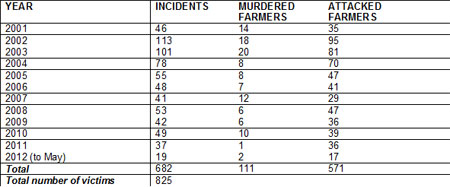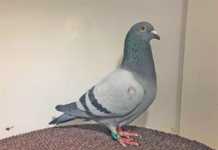It’s another thing being circumspect under oath, however. When Kwanalu security consultant Koos Marais was called upon to testify at the Pietermaritzburg High Court trial of Mzwandile Magubane (23) last week, he did so armed with the farm murder statistics for KwaZulu-Natal for the past 11 years.
He explained to the court that it’s part of his duties to keep statistics on farm attacks and murders, and that the statistics are verified by the SAPS once a month.
Figure 1. Kwanulu’s farm attack stats

His testimony continued as follows:
State Prosecutor Dheelan Naidoo (DN): Why are farm attacks so prevalent? Why are they so destructive?
Koos Marais (KM): The commercial farm is perceived to be an easy target. It is isolated and far from SAPS and private security companies, who take time to respond. Farms are also open workplaces and very difficult to fortify during the day. The high number of people coming and going means access cannot be regulated easily.
People coming and going on any one day can include Eskom and Telkom workers, farm worker union representatives, politicians, employees of other companies, representatives of state departments and visitors of staff.
The element of surprise is almost always in the hands of perpetrators. There are also cases where insiders, like farm workers, are intimidated into giving out information on farm operations. All the security in the world means nothing when intimidation is used. A farmer and his staff are seldom heavily armed and communication is often problematic because telephone lines in farming districts are being stolen and not replaced.
DN: What are some of the consequences of the murders?
KM: Normally the spouse of a murdered farmer will pack up and leave. We are aware of many who have migrated to other countries. There are countries whose governments have created opportunities for farmers and when farmers respond this expertise is lost to South Africa.
Some farmers also change to less vulnerable activities or change the way they farm, for example they might change from food cropping to timber. This results in a loss of employment resulting in a drop in income to homes on farms. The loss of employment has an effect on both the local and the national economy, as consumer products become more expensive.
Farm attacks and murders also sabotage the state’s strategic plan for agriculture in the country. As attacks rise so security systems are improved, in terms of alarm systems, electrified fencing and panic buttons. Personal and staff awareness of security risks is heightened and, after an attack, staff are more willing to be actively involved in security.
The cost of security differs from area to area, and varies according to distance from town to farm, but on average a guard will cost R7 000 per month, and many farmers need two.
Security hardware like electric fencing and alarm systems cost around R70 000 on average and this is a once-off payment. Radio linkage and other security-related communication programmes cost between R60 000-R100 000.
All in all, good security costs about R100 000 a year. Excellent police work and high sentences have an effect on farm murders. In the KwaZulu-Natal Midlands most of those who have attacked farms are currently behind bars.
DN: What do you think motivates the attacks?
KM: Mostly the attacks are motivated by greed. The targets are soft and vulnerable and often there is no fear. Often there are cases where, if the attacker is known to the farm, he will murder staff, and in some instances even his own informant.
Marais went on to praise the work done by the SAPS in the KZN Midlands. This would be the Pietermaritzburg Organized Crime Unit, which consists of only nine officers, the youngest of whom is 47.
The unit’s track record is as follows:
* Total murder cases: 20
* Total murder cases solved: 19
* Total cases finalised in court: 18
* Total of accused: 49
* Accused sentenced to 32 life sentences: 28
* Accused sentenced to 268 years imprisonment: 12
Accused still on trial: 5
Accused deceased: 5
Mzwandile Magubane became one of the ‘accused sentenced’ statistics when judge MT Ncube handed him three life sentences, as well as some additional time for robbery and attempted robbery, on Friday, 27 July 2012.













